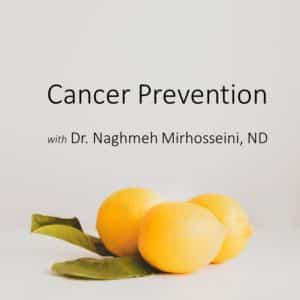Cancer Prevention Strategies

Precision Nutrition
Foods contain bioactive components with significant anti-cancer activity. The growing knowledge of interactions between nutrients and the expression of certain genes could lead to cancer prevention/therapy based on precision nutrition strategies. Our first cancer prevention strategy might include healthy eating tips, meal plans, and an anti-inflammatory, high-protein, low-carbohydrate diet.
Being Active
Research tells us that patients who are physically active are less likely to die of cancer. A physically active lifestyle is protective against the occurrence of some common cancers. At KIHC, our second strategy for cancer prevention is to educate, encourage and create an individualized Being Active plan.
Screening Awareness
There are screening protocols for most common cancers that are conducted in specified intervals such as mammography, PAP test, colonoscopy, etc. As our third strategy, we educate our patients regarding screening tests, determine the indications considering their family history and evaluate the results to assess the risk and adjust our preventative strategies accordingly.
Lifestyle Change
Adopting a healthy lifestyle that includes limited alcohol consumption and avoidance of smoking, is associated with up to 58% reduction of cancer morbidity and mortality! We have many tools to help you achieve these goals, including acupuncture, herbal medicine, supplements and different behavioral techniques.
Toxin Education
Hormone-disrupting chemicals such as pesticides, plasticizers, and cosmetic products, and heavy metals such as mercury, cadmium and lead, are all around us and can affect the development and progression of cancer. We aim to educate patients about cancer-causing chemicals and pollutants in our environment, our homes, and workplaces.
Chronic Disease Management
Current evidence shows that heart disease, high blood pressure, high cholesterol, diabetes, chronic kidney disease, lung disease, and gouty arthritis might contribute to more than one-fifth the risk for cancer occurrence, and more than one-third of the risk for cancer death. Our sixth cancer prevention strategy at KIHC is to identify and treat ongoing chronic diseases through regular follow-ups, to help prevent cancer occurrence or progression.
*Photo by Dominika Roseclay on Pexels.com.